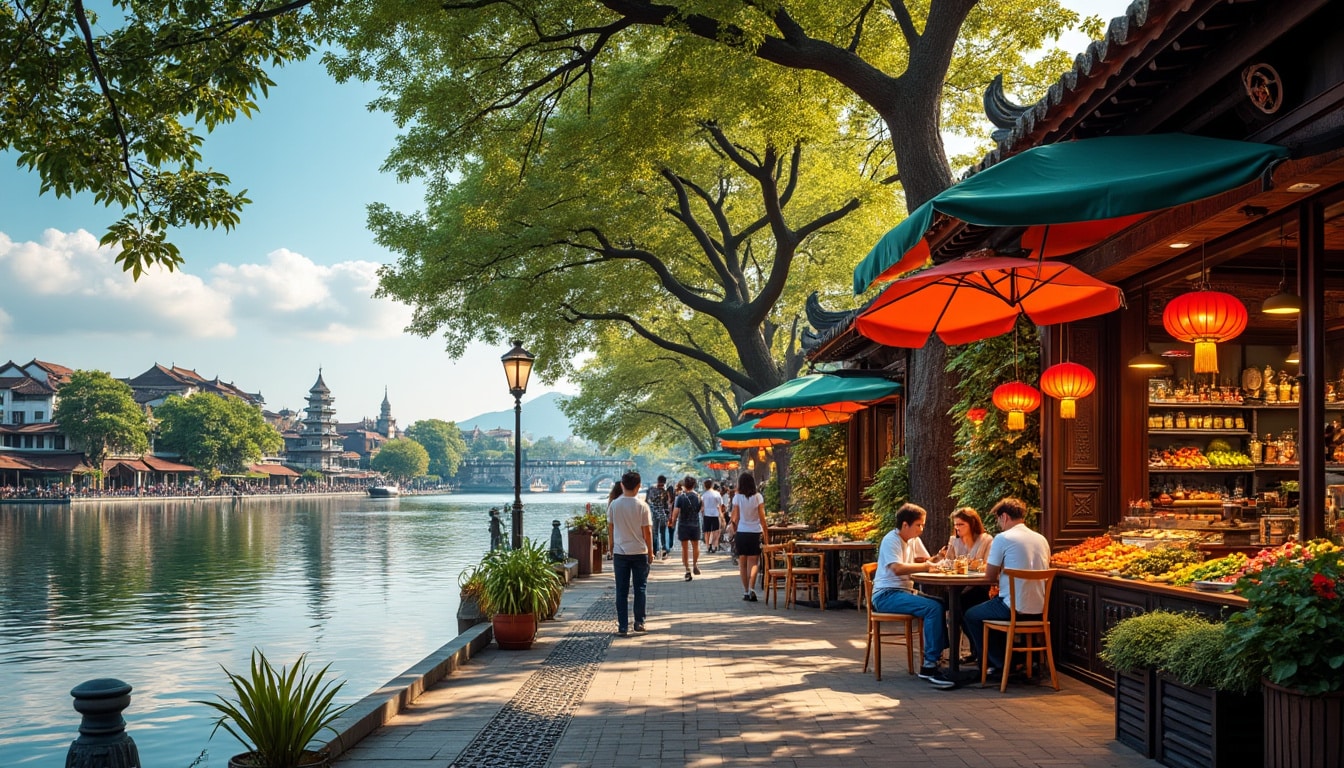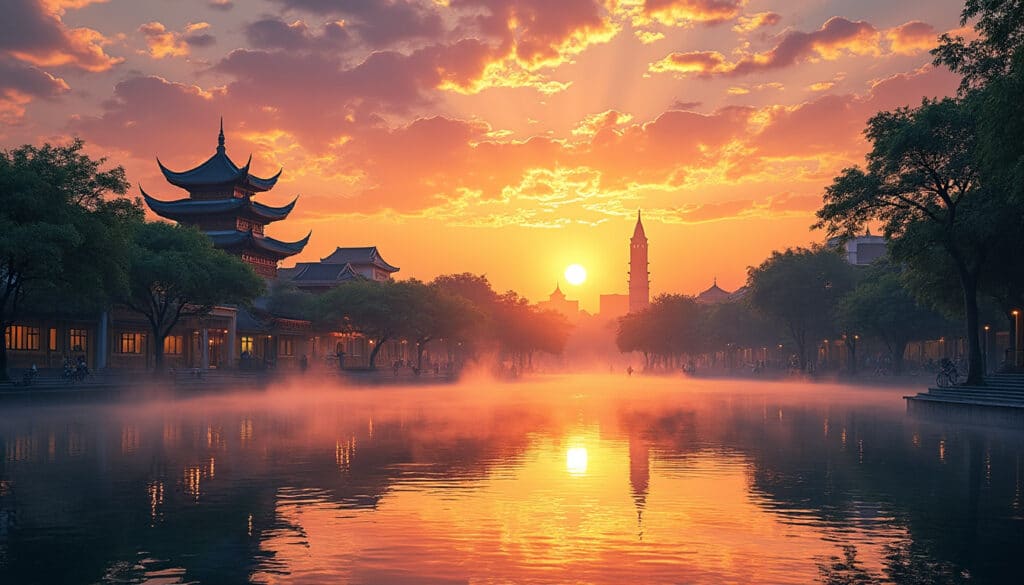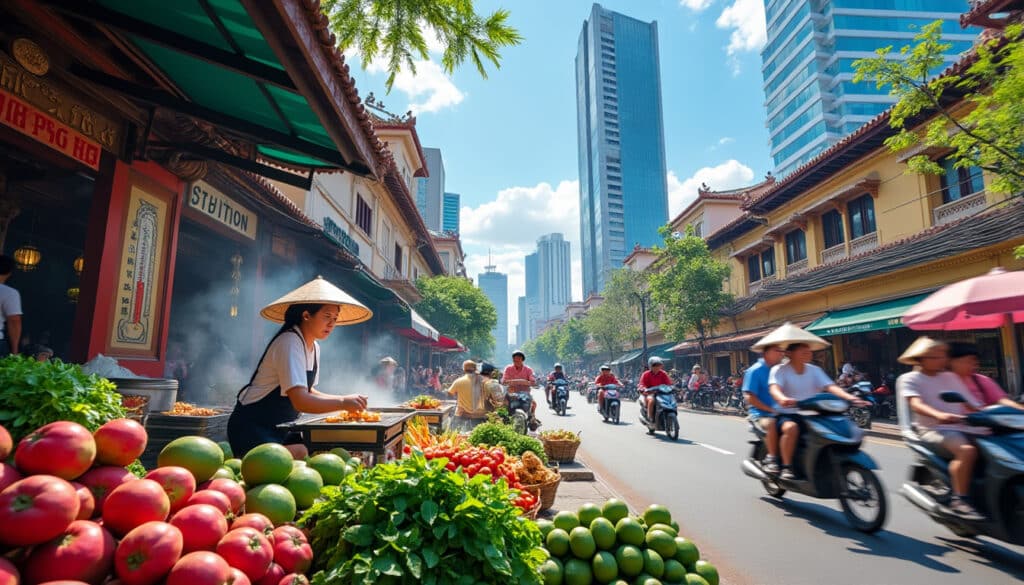Hanoi, the vibrant capital of Vietnam, showcases a spectrum of weather conditions throughout the year, thanks to its unique geographic location. Encompassing the vivacious street life and the rich history of the city, understanding its climate is essential for both locals and tourists planning their visit. From the hustle and bustle of Old Quarter markets to the serene beauty of Hoan Kiem Lake, the weather here influences every aspect of daily life, dictating what to wear, where to visit, and how to navigate the day.
Exploring Hanoi’s Rich Seasonal Variations
Hanoi is known for its diverse seasonal changes, significantly affecting the lifestyle and activities of its residents and tourists. The city, under the influence of a humid subtropical climate (Köppen Cwa), alternates between a wet and dry season, blending the features of the monsoon with subtropical elements.
The temperature in Hanoi can be described as a rollercoaster of climate variations, starting from chilly winters to scorching summers. During the winter months, from December through February, temperatures can drop to as low as 14°C (57°F), with January being the coldest. This period also marks the least humid time of the year with an average humidity around 69%, offering relatively clear skies and minimal rainfall.
In contrast, the summer months of June to August push the mercury up to an average high of 35°C (95°F). This season is characterized by oppressive humidity levels, often creeping above 80%, accompanied by the heaviest rainfall. Particularly in August, the city reports high precipitation levels of around 135mm (5.31″), leading to vibrant green landscapes but also potential flooding in low-lying areas.
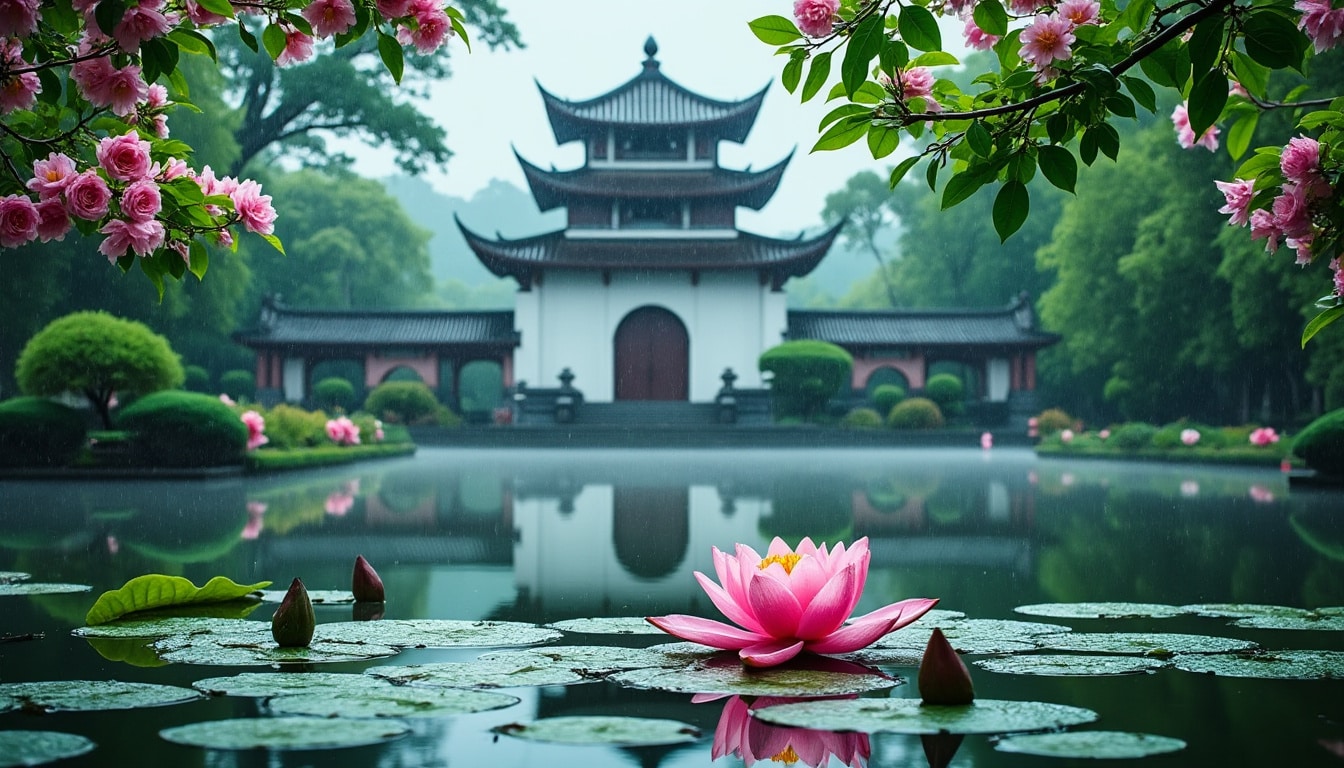
Impact of Seasons on Outdoor Activities
Visitors and residents alike need to consider the seasonal changes while planning activities. Spring and autumn are ideal for exploring the city’s outdoor attractions, as these seasons offer a comfortable temperature range of between 18°C (64°F) and 28°C (82°F). During this time, Hanoi exudes a refreshing ambiance, perfect for leisurely walks along Hoan Kiem Lake or exploring the ancient temples scattered across the city.
- 🌸 Spring (March-April): Temperatures rise gradually, allowing for picnics and early morning tai chi in the parks.
- 🍂 Autumn (September-November): Offers cooler temperatures that are optimal for cycling tours and visiting the countryside.
To make the most of your visit, stay informed about the weather by checking reliable resources like Hanoi Climate and Weather. Here, you’ll find detailed climate insights, helping to plan your itinerary more effectively.
| Month | Average Temp (°C) | Rainfall (mm) | Humidity (%) |
|---|---|---|---|
| January | 17 | 13 | 69 |
| February | 18 | 11.9 | 72 |
| June | 33 | 160.1 | 85 |
| August | 30 | 226.2 | 80 |
Clothing Recommendations for Each Season in Hanoi
In Hanoi, understanding the seasonal clothing needs can significantly enhance your comfort and enjoyment. Acknowledging the city’s climate requirements involves picking the right items from brands like WeatherTech, North Face, Columbia, Patagonia, and Marmot, ensuring you’re well-prepared for whatever weather you encounter.
Throughout the winter months, when temperatures can dip significantly, it is advisable to pack warm layers. Items like thermal wear, sweaters, and jackets from Marmot or Columbia are excellent choices. Coupling these with waterproof footwear from Merrell keeps you dry and comfortable during the sudden downpours that can surprise even in the cold.
During summer, breathable clothing becomes indispensable due to the high temperatures and humidity. Lightweight clothing made with moisture-wicking materials, commonly found in Under Armour or Patagonia, can keep you cool and sweat-free. Havaianas flip-flops are also a popular option, making it convenient and comfortable for both city walks and beach visits.
- 🧥 Winter: Invest in thermal layers and a sturdy raincoat.
- 👕 Summer: Opt for light, breathable fabrics and don’t forget sun protection like hats and sunglasses.
- 🍂 Spring/Autumn: Layering is key to handle fluctuating temperatures effectively.
Considering the specific clothing needs for different activities and seasons allows both residents and travelers to enjoy Hanoi’s rich heritage and modern vibes comfortably. For more insights on specific cold weather apparel for Hanoi, check this resource.
Weather-appropriate Gear and Accessories
Essential accessories complement your travel wardrobe in Hanoi. A durable umbrella is non-negotiable in the rainy season. Meanwhile, the summer season makes sunglasses a must-have to combat the intense UV rays, ensuring that your eyes remain protected.
For adventurous outings like trekking in the surrounding hills, lightweight hiking boots, especially from Merrell or Outdoor Research, are recommended. These not only provide comfort but also offer traction and support against the diverse and often challenging terrains.
Preparing for the Challenges of Monsoon Season in Hanoi
The monsoon season in Hanoi, predominantly during July and August, presents a different set of challenges. High humidity levels and frequent rainfall can disrupt plans, making proper preparation critical for enjoyable experiences.
With rainfall peaking as high as 226mm in August, one must be wary of the impact on travel and daily life. Understanding the risks of flooding and planning routes with this knowledge is crucial. Resources like Hanoi’s Flooding and Natural Risks provide valuable insights into navigating the city’s wetter periods.
Here are some tips to navigate Hanoi during its monsoon:
- 🌧️ Stay Updated: Regularly check the weather predictions to anticipate any changes and plan your day accordingly.
- 🔄 Flexible Plans: Avoid strict itineraries; instead, be prepared to adapt your schedule based on the weather.
- ☔ Waterproof Essentials: Carry waterproof clothing alongside gear like protected-zippers to secure your belongings from the rain.
| Month | Average Rainfall (mm) | Flood Risk |
|---|---|---|
| July | 204.0 | High |
| August | 226.2 | Very High |
| September | 173.8 | Moderate |
| October | 84.8 | Low |
Understanding Monsoon’s Impact on Transportation
Navigating through Hanoi during the monsoon requires an understanding of the city’s infrastructure and reliable transport options. Public transport might experience delays, and pedestrian routes can get slippery. Using local transportation options like grab bikes or cabs can be more convenient and safe during unpredictable weather conditions.
The monsoon is also a time to discover indoor attractions, like museums and traditional tea houses, allowing for a different slice of Hanoi’s vibrant culture. This emphasizes the importance of flexibility in travel plans, making room for alternate activities that still hold the charm and essence of the city despite the rain.
How Hanoi’s Weather Shapes Its Culinary Scene
Hanoi’s weather not only affects travel and outdoor activities but also dictates its vibrant culinary scene. The changing seasons breathe a fresh variety into the food available, heavily influenced by local ingredients flourishing in specific climates.
The winter months witness a surge in heartwarming dishes like pho and hotpots, providing a comforting warm embrace against the chilly air. Spring rolls and Bun Cha are popular throughout the year but taste especially delightful in the crisp spring air. Discovering the flavorful embrace of Hanoi’s street food under the guiding hands of seasoned chefs offers an unmissable opportunity for gastronomes.
- 🍜 Winter Pleasures: Pho, a steaming aromatic broth filled with rice noodles and herbs seemingly finds its perfect ambiance during winter’s cool embrace.
- 🥢 Spring/Summer Delights: Light and fresh salads and grilled meats complement the warmer temperatures mirroring the season’s bounty.
- 🥥 Monsoon Comforts: Traditional dishes prepared from seasonal produce offer rich, spicy flavors, perfect during cooler rainy days.
Exploring Hanoi’s culinary delights during different weather conditions allows travelers to immerse themselves in the culture more deeply. It’s not just about the flavors but the connection of each dish with the season’s weather. For those interested in understanding hot-weather cuisine, there’s plenty to uncover.
The Social Dynamics of Food and Weather
The local culture strongly ties food to the seasonal weather, creating community bonds during shared meals, celebrating the bounty the weather enables. Outdoor gatherings and festivals often align with specific weather conditions, offering visitors a chance to experience Hanoi’s vibrant culture fully.
In the ever-busy cafes and streetside food stalls, the typical sounds of laughter and conversation unveil the deep-rooted connection between weather, food, and social harmony prevalent in this city.
FAQs About Hanoi’s Climate
These frequently asked questions address common concerns visitors might have when planning a visit to Hanoi.
- What is the best time to visit Hanoi?
The best time for warm-weather activities in Hanoi is from early February to mid-April and late October to late December due to comfortable temperatures and fewer rain days. - Does Hanoi experience snowfall?
Snow is exceedingly rare in Hanoi due to its subtropical climate, but for anyone interested, a detailed account of snow occurrences is available. - How does humidity affect travel plans in Hanoi?
The high humidity, especially in summer, can affect comfort levels. It’s best to plan travel during cooler months or carry lightweight clothing for warmth and humidity management. - Which months are prone to flooding?
The monsoon months, particularly July and August, see heightened risks of flooding. Awareness of natural risks can aid in preparedness and safety. - How does Hanoi’s weather affect local cuisine?
Seasonal produce influences culinary preferences, with warmer dishes like pho popular in winter, and lighter meals preferred in summer.

The city of Hanoi, a bustling hub of culture and history, offers a distinctive climate that shapes its daily life. Nestled in the heart of Vietnam, Hanoi experiences a variety of weather conditions, from humid summers to mild, dry winters.…

Hanoi, the vibrant capital city of Vietnam, not only captivates visitors with its rich cultural heritage and delectable street food but also with a unique climatic variation that sees the city shivering under cold weather conditions during certain months of…

Flooding and natural risks in Hanoi
Flooding Challenges and Natural Risks in Hanoi The vibrant city of Hanoi, known for its unique blend of age-old traditions and rapid urban growth, is no stranger to water-related challenges. Nestled along the banks of the Red River, Hanoi experiences…

As the summer sun climbs higher in the sky, the bustling streets of Hanoi transform under the play of light and shadow, painting a vivid tableau of life in Vietnam’s dynamic capital. Known for its rich cultural heritage and vibrant…
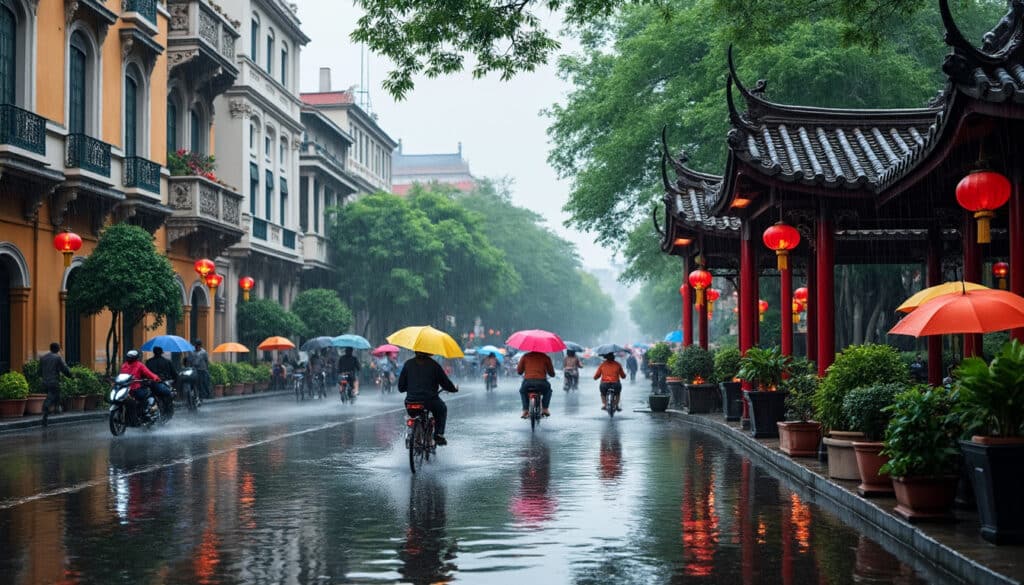
Rain and precipitation in Hanoi
Renowned for its vibrant streets, exquisite cuisine, and rich cultural history, Hanoi, the bustling capital of Vietnam, also presents weather patterns worth exploring. The city’s climate plays a crucial role in shaping its everyday life and the experience of both…
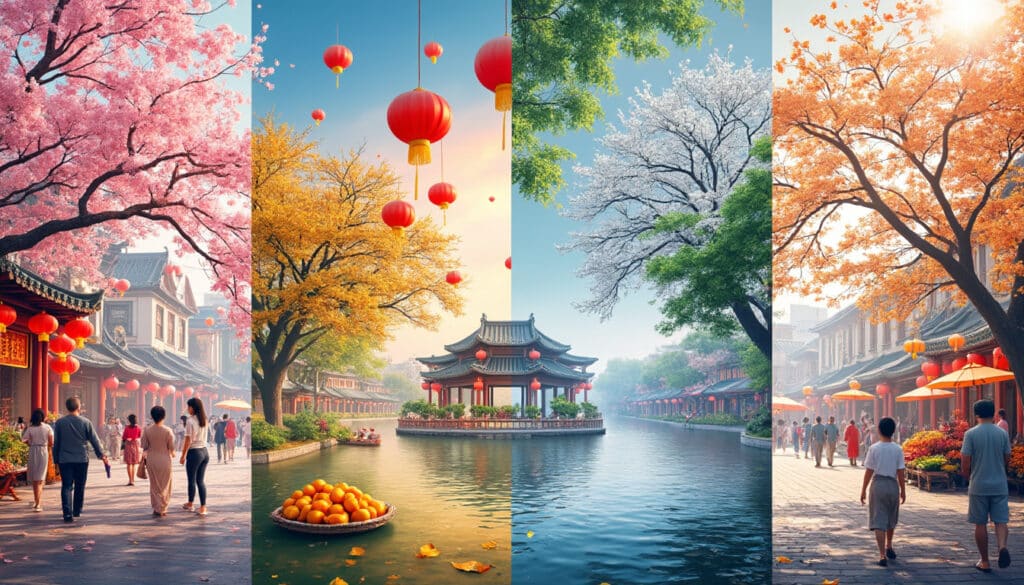
Hanoi, the captivating capital of Vietnam, is a place where the past seamlessly merges with the present. This city offers a unique blend of rich history, vibrant culture, modernity, and a distinct four-season climate, making it an exciting destination for…
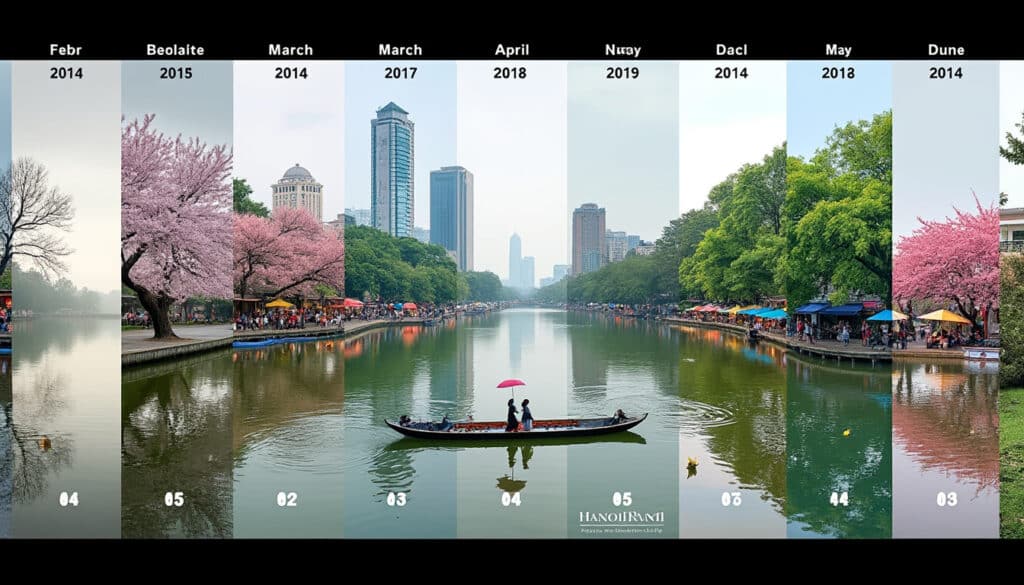
Hanoi, the vibrant capital city of Vietnam, is known for its unique weather patterns that change remarkably over the months. Whether it’s the cool breeze whispering through Hoan Kiem Lake in January or the heavy rains nurturing tropical greenery in…
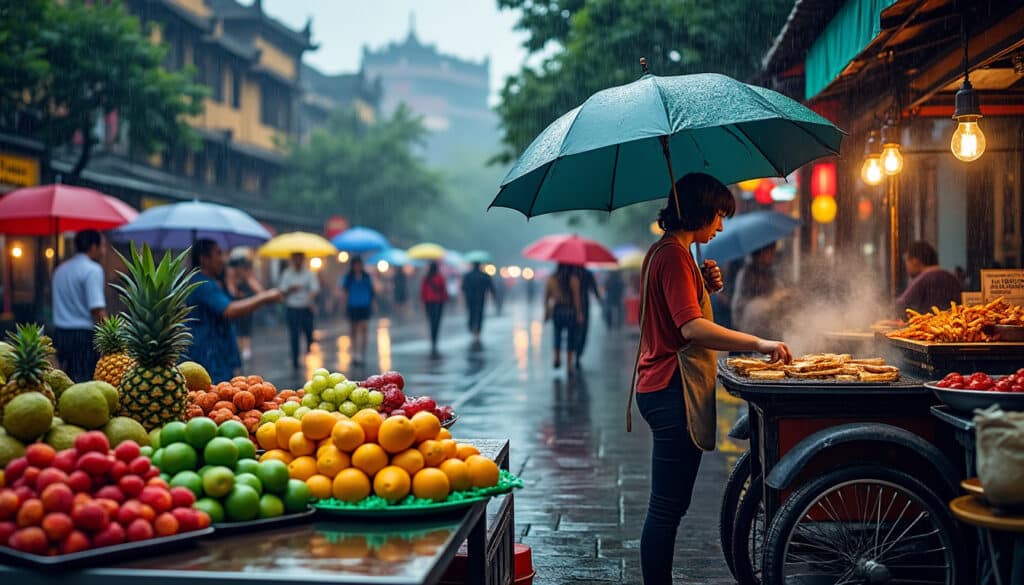
What is the weather like in Hanoi?
Hanoi is known for its vibrant street life, rich history, and diverse cuisine. Yet, understanding its weather patterns is crucial for enjoying all the city has to offer. Hanoi’s climate is characterized by hot, humid summers and cool, dry winters,…

